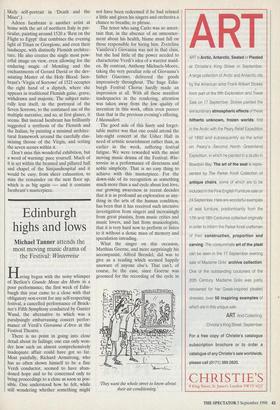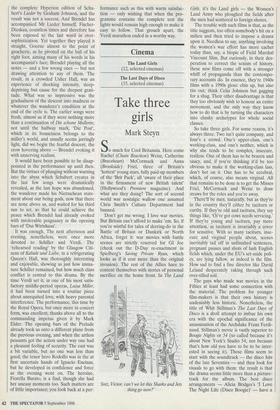Edinburgh highs and lows
Michael Tanner attends the most moving music drama of the Festival: Winterreise Having begun with the noisy whimper of Berlioz's Grande Messe des Morts in a poor performance, the first week of Edin- burgh this year came to a close with that obligatory non-event for any self-respecting festival, a cancelled performance of Bruck- ner's Fifth Symphony conducted by Gunter Wand, the alternative to which was a paralysingly embarrassing concert perfor- mance of Verdi's Giovanna d'Arco at the Festival Theatre.
There is no point in going into close detail about its failings; one can only won- der how such an almost comprehensively inadequate affair could have got so far. Most painfully, Richard Armstrong, who has so often shown himself to be a fine Verdi conductor, seemed to have aban- doned hope and to be concerned only to bring proceedings to a close as soon as pos- sible. One understood how he felt, while still wondering whether something might not have been redeemed if he had relaxed a little and given his singers and orchestra a chance to breathe, to phrase.
The tenor who sang Carlo was so uncer- tain that, in the absence of an announce- ment about his health, blame must fall on those responsible for hiring him. Zvetelina Vassileva's Giovanna was not in that class, but she had little of the power needed to characterise Verdi's idea of a warrior maid- en. By contrast, Anthony Michaels-Moore, taking the very peculiar role of Giovanna's father Giacomo, delivered the goods impressively throughout. The huge Edin- burgh Festival Chorus hardly made an impression at all. With all these manifest inadequacies in the rendering, attention was taken away from the low quality of invention in this work, often even poorer than that in the previous evening's offering, I Masnadieri.
The good side of this hasty and forget- table matter was that one could attend the late-night concert at the Usher Hall in need of artistic nourishment rather than, as earlier in the week, suffering festival fatigue. We were rewarded with the most moving music drama of the Festival: Win- terreise in a performance of directness and noble simplicity. That is no easy thing to achieve with this masterpiece. For the down-side of its recognition as something much more than a sad cycle about lost love, our growing awareness in recent decades that it is as profound an exploration as any- thing in the arts of the human condition, has been that it has received such intensive investigation from singers and increasingly from great pianists, from music critics and music lovers, and last from musicologists, that it is very hard now to perform or listen to it without a dense mass of memory and speculation intruding.
What the singer on this occasion, Matthias Goerne, and more surprisingly his accompanist, Alfred Brendel, did was to give us a reading which seemed happily unaware of anyone else's. That can't, of course, be the case, since Goerne was groomed for the recording of the cycle in `They want the whole street to know about their air conditioning.' the complete Hyperion edition of Schu- bert's Lieder by Graham Johnson, and the result was not a success. And Brendel has accompanied Mr Lieder himself, Fischer- Dieskau, countless times and therefore has been exposed to the last word in over- sophistication. Yet together they played it straight, Goerne almost to the point of gaucherie, as he pivoted on the ball of his right foot, aiming many of his words in his accompanist's face; Brendel playing all the notes — and a few wrong ones — but not drawing attention to any of them. The result, in a crowded Usher Hall, was an experience of shocking intensity, sleep- depriving but cause for the deepest grati- tude. What was so impressive was the gradualness of the descent into madness or whatever the wanderer's condition at the end of the cycle is. The earlier songs were fresh, almost as if they were nothing more than a continuation of Die schone Mullerin; not until the halfway mark, 'Die Post', which in its bounciness belongs to the miller's world, and usually seems jarringly light, did we begin the fearful descent, the crow hovering above — Brendel evoking it with unnerving realism.
It would have been possible to be disap- pointed in the performance up until then. But the virtues of plunging without warning into the abyss which Schubert creates in the last few songs were dramatically revealed, as the last hope was abandoned, the wanderer made his Nietzschean state- ment about our being gods, now that there are none above us, and waited for his third sun to set, so that he could achieve the peace which Brendel had already evoked with intolerable poignancy in the opening bars of 'Das Wirtshaus'.
It was enough. The next afternoon and evening, nonetheless, were once more devoted to Schiller and Verdi. The `rehearsed reading' by the Glasgow Citi- zens of Kabale and Liebe, in a refrigerating Queen's Hall, was thoroughly interesting and enjoyable, showing us just how imma- ture Schiller remained, but how much class conflict is central to this drama. By the time Verdi set it, in one of his most satis- factory middle-period operas, Luisa Miller, it had been turned into a routine piece about unrequited love, with heavy parental interference. The performance, this time by the Royal Opera, but once more in concert form, was excellent, thanks above all to the commanding impetus given it by Mark Elder. The opening bars of the Prelude already took us onto a different plane from the previous evening, and when the artless peasants got the action under way one had a pleasant feeling of security. The cast was a bit variable, but no one was less than good; the tenor hero Rodolfo was in the at first uncertain hands of Ignacio Encinas, but he developed in confidence and force as the evening went on. The heroine, Fiorella Burato, is a find, though she had her uneasy moments too. Such matters are of little importance; you look back at a per- formance such as this with warm satisfac- tion — only wishing that when the pro- gramme contains the complete text the lights would remain high enough to make it easy to follow. That grouch apart, the Verdi marathon ended in a worthy way.



























































 Previous page
Previous page